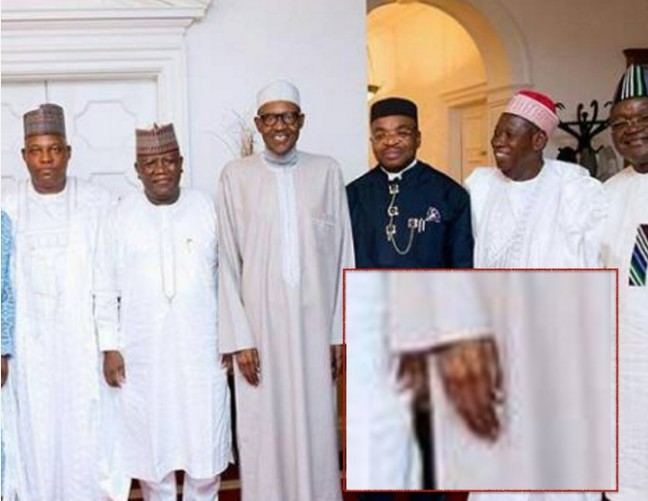
Despite recent high-profile visits to ailing President Muhammadu Buhari in the United Kingdom, where for close to 90 days he has been undergoing treatment for a grave illness, a U.S based online news agency, SaharaReporters has learned that the Nigerian president is not as healthy as has been portrayed by members of his inner circle. Mr. Buhari’s illness remains officially shrouded in secrecy, but sources close to his inmost associates had long told this website that the president was beset by cancer.
In recent weeks, the cabal around Mr. Buhari has used a flurry of well-orchestrated visits to the ailing president by political personages to sell a narrative of “miraculous recovery.” But such rosy impressions are belied by a palpable deterioration in President Buhari’s health, according to accounts offered by a few sources knowledgeable about the Nigerian leader’s condition.
President Buhari abruptly left Nigeria for the UK on May 7, 2017, arriving at Luton airport in London. He immediately proceeded to a London hospital where treatment had been set up prior to his arrival, said one of our sources. According to that source, Mr. Buhari’s initial treatment was so grueling that it left him devastated and weak, with severe difficulty speaking and eating.
For weeks after his arrival in the UK, no political figure in Abuja heard from Mr. Buhari either in person or via phone calls. In fact, for some time his aides with direct access to him were reduced to just two, while the remainder of the retinue that traveled with him was left in hotels in London, kept in the dark about his health condition.
The prolonged period during which Mr. Buhari was incommunicado fueled rumors that he was completely incapacitated. Some members of the cabal around him, as well as his wife, traveled to London in search of the president, but mostly came back empty-handed.
The spell was somewhat broken in late June when Mr. Buhari’s aides released an audio recording of his Sallah greetings to Muslims celebrating Eid-el-Fitr. The president’s message, spoken in a weary voice in Hausa, immediately drew criticism from Nigerians who pointed to the fact that the message seemed to ignore the significant portion of non-Hausa speaking Muslims in Nigeria.
Mr. Buhari’s sign of life in his Sallah message seemed to energize members of his cabal to start envisioning a future past his presidency. In Saudi Arabia, a major player among the cabal, Isa Funtua, met with numerous political players, including Senate President Bukola Saraki, whom he designated as the arrowhead of a post-Buhari power arrangement.
A source familiar with that meeting disclosed that Mr. Funtua proposed that, even if Buhari were in a vegetative state, acting President Yemi Osinbajo should be barred from becoming the substantive president. His fear was that an Osinbajo presidency would alter the power equation for members of the cabal who believe that power should remain in the north for eight years. Mr. Funtua reportedly reminded the audience in Saudi Arabia that the last time an apparently “soft” southerner, Goodluck Jonathan, was given power, he used state resources “to marginalize the north.”
He described Mr. Osinbajo as politically “stronger” and “wiser” than Mr. Jonathan, especially because of his godfather, former Governor Ahmed Bola Tinubu, whom he suggested should be completely neutralized because he was too ambitious and politically strategic.
In a slight deviation from the Funtua plan, the other half of the cabal led by the Chief of Staff, Abba Kyari, was devising another agenda. The Kyari group would be open to extracting a resignation letter from Mr. Buhari and accept Mr. Osinbajo’s assumption of full presidential powers if the current acting President would agree to pick Attorney General and Minister of
Justice, Abubakar Malami, as his Vice President.
However, a snag to the plan was that Mr. Malami and Mr. Osinbajo have pretty much parted ways. Acting President Osinbajo has been directly coordinating justice-related matters, even convening meetings related to the national prosecution committee behind Mr. Malami’s back.
While the cabal’s jostling was going on, Mrs. Buhari traveled to London to see her ailing husband. A diplomat source said the First Lady rented an apartment in London away from the “Abuja House” residence where her husband stays.
SaharaReporters learnt that three or four days after her arrival in
London, Mrs. Buhari was told to join her husband for dinner. The meeting turned out heartwarming as Mr. Buhari reportedly managed to speak and to sit to eat with her. After subsequently spending more time with her husband, Mrs. Buhari told other family members that he








All Comments